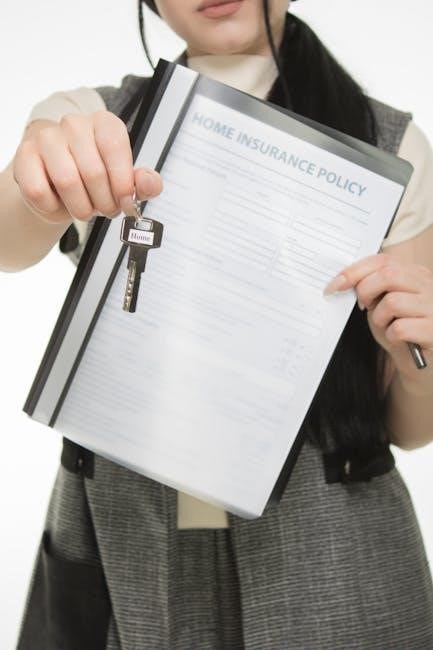REIWA Commercial Lease Agreement: A Comprehensive Guide
Navigating commercial leases in Western Australia requires understanding REIWA’s agreements․ This guide provides a comprehensive overview‚ covering key components‚ legal frameworks like the Commercial Tenancy Act‚ negotiation tips‚ financial aspects‚ and dispute resolution․ Find resources and assistance․
Understanding Commercial Lease Agreements in Western Australia
Commercial lease agreements in Western Australia‚ especially those provided by REIWA‚ require careful consideration․ The Commercial Tenancy (Retail Shops) Agreements Act 1985 aims to balance power between landlords and tenants‚ particularly in retail settings․ However‚ smaller landlords might find tenants possess greater negotiating leverage․ Understanding the nuances of these agreements is crucial for both parties․ REIWA offers resources and standardized forms to assist with creating fair and legally sound leases‚ promoting transparency and protecting the interests of all stakeholders in the commercial property market․ Seek professional advice when navigating complex lease terms․
Key Components of a REIWA Commercial Lease Agreement
REIWA’s commercial lease agreements consist of essential parts‚ including property particulars‚ lease terms‚ and specific conditions․ Understanding these components is crucial for both landlords and tenants to ensure a legally sound and mutually beneficial arrangement․
Part A: Standard Commercial/Industrial Property Lease
REIWA’s Part A is a standard lease document designed for commercial and industrial properties‚ excluding retail premises covered by the Commercial Tenancy Act․ It outlines the core terms‚ including permitted use‚ lease duration‚ and rent․ This part incorporates the “Particulars of the Lease” document‚ detailing specific property information and agreed-upon conditions․ It’s crucial to carefully review all sections in Part A to fully understand the obligations and rights of both the landlord and the tenant under the lease agreement‚ ensuring clarity and minimizing potential disputes․
Particulars of the Lease
The “Particulars of the Lease” section within a REIWA commercial lease agreement is crucial as it contains property-specific information․ This includes the names and addresses of both the landlord and tenant‚ the property’s address‚ and a detailed description of the leased premises․ It also outlines the commencement date and duration of the lease term‚ along with any option to renew; Furthermore‚ this section specifies the agreed-upon rent amount‚ payment frequency‚ and details regarding any applicable rent review mechanisms․ Accurate completion of this section ensures clarity․

Legal Framework and Regulations
Commercial leases in WA are governed by laws like the Commercial Tenancy (Retail Shops) Agreements Act 1985‚ ensuring transparency and fairness․ Consumer Protection oversees retail tenancies‚ focusing on contract information and obligations for both parties involved․
The Commercial Tenancy (Retail Shops) Agreements Act 1985
This Act addresses the power imbalance between large shopping center owners and smaller tenants․ It regulates lease agreements for retail and specified businesses‚ even outside shopping centers․ For single-property landlords‚ this balance can shift‚ granting tenants more negotiation power․ It emphasizes transparency and fairness in contracts‚ as overseen by Consumer Protection․ Tenants should understand their rights and obligations as defined within the Act‚ especially concerning options to renew and market rent reviews․ This Act intends to help retail and commercial tenants understand their obligations․
Consumer Protection and Transparency
Consumer Protection administers the Commercial Tenancy (Retail Shops) Agreements Act 1985‚ which emphasizes transparency and fairness in commercial lease contracts․ The Act seeks to ensure that all parties involved‚ particularly tenants‚ have access to necessary information․ This promotes informed decision-making․ Landlords must disclose relevant details about the property and lease terms․ This ensures that tenants are not disadvantaged by hidden clauses or a lack of understanding․ Transparency fosters trust and reduces potential disputes during the tenancy period‚ which is vital for a successful lease․
Negotiating a Commercial Lease Agreement
Successfully negotiating a commercial lease requires understanding tenant rights‚ obligations‚ market rent review processes‚ and renewal options․ Effective negotiation ensures favorable terms and protects your business interests throughout the lease period․
Tenant’s Rights and Obligations
Understanding tenant rights and obligations is crucial when entering a commercial lease agreement under REIWA guidelines․ Tenants have the right to transparent information and fair contract terms‚ as emphasized by the Commercial Tenancy (Retail Shops) Agreements Act 1985․ Obligations include adhering to lease terms‚ paying rent and outgoings promptly‚ and maintaining the property as agreed․ Familiarize yourself with these aspects to ensure a smooth tenancy and avoid potential disputes․ Seek clarification on clauses before signing․
Market Rent Review and Option to Renew
Negotiating a commercial lease involves considering market rent reviews and renewal options․ Before exercising an option to renew‚ ascertain the market rent to ensure commercial viability․ Landlords should provide clear information about the review process․ Tenants must provide a Notice of Exercise within the stipulated timeframe‚ usually 30 days before the lease ends․ Understanding these clauses is essential for long-term planning and avoiding unexpected rent increases․ Seek professional advice to determine a fair market rent in Western Australia․
Financial Aspects of Commercial Leases
Commercial leases involve rent‚ security bonds‚ and outgoings․ Rent is often paid in advance․ Security bonds are lodged with the Bond Administrator․ Understanding these financial obligations is critical for both landlords and tenants in Western Australia․
Rent‚ Security Bond‚ and Outgoings
Understanding the financial commitments in a commercial lease is vital․ Rent is the periodic payment for occupying the property․ The security bond‚ lodged with the Bond Administrator‚ protects the landlord against damages or unpaid rent․ Outgoings encompass expenses like rates‚ taxes‚ and maintenance‚ potentially payable by the tenant․ Careful review of these clauses ensures clarity and avoids financial disputes․ Market rent reviews are crucial when renewing leases‚ influencing future rent adjustments based on current market conditions․
Payment of Rent in Advance
Commercial leases often stipulate payment of rent in advance‚ typically covering a specified period‚ such as two weeks or a month․ This upfront payment provides the landlord with initial financial security․ It’s crucial for tenants to understand these terms‚ budgeting accordingly to meet the obligations․ The REIWA commercial lease agreement will clearly outline the frequency and amount of rent payable in advance․ Always review this section carefully to avoid potential breaches of the lease agreement due to late or insufficient payments․
Resources and Assistance
Navigating commercial leases can be complex․ REIWA offers resources for finding properties and agents․ Consumer Protection provides guidance on tenancy laws․ Seek professional legal advice for specific situations and dispute resolution assistance when needed for optimal outcomes․
REIWA’s Role in Commercial Real Estate
REIWA serves as a central hub for commercial real estate in Perth and Western Australia․ They provide a platform to search for the latest commercial properties available for lease and sale‚ connecting potential tenants and buyers with suitable properties․ Furthermore‚ REIWA offers AgentFinder‚ a tool to locate the right commercial real estate agent‚ facilitating smoother transactions․ While REIWA produces a commercial lease form‚ it’s not a “standard” form‚ emphasizing the need for careful review and customization․
Finding Commercial Properties for Lease or Sale
Locating suitable commercial properties for lease or sale in Western Australia is made easier with online resources․ REIWA’s website offers search functionality to find the latest commercial listings across Perth and WA․ These platforms provide filters to refine searches based on property type‚ such as office spaces‚ retail locations‚ or warehouses․ By leveraging these search tools‚ prospective tenants and buyers can efficiently identify properties that align with their specific business needs and operational requirements․

Free Download and Modification of REIWA Lease Agreements
Accessing REIWA lease agreements is convenient with available PDF templates․ Modifying these templates can be achieved through platforms like DocHub‚ allowing for customization to fit specific lease terms and conditions efficiently․
Availability of PDF Templates
REIWA commercial lease agreements are often available as PDF templates‚ providing a convenient starting point for landlords and tenants․ These templates offer a standardized format‚ ensuring all essential clauses are included․ While REIWA may offer these resources‚ other platforms may also provide similar templates for download․ Always verify the template’s suitability for your specific situation and consult legal advice to ensure compliance with current Western Australian legislation․ Ensure the template aligns with the Commercial Tenancy (Retail Shops) Agreements Act 1985‚ if applicable․
Customizing Lease Agreements with DocHub
DocHub presents a practical solution for modifying PDF versions of REIWA commercial lease agreements․ This platform enables users to easily adjust the agreement to fit specific needs and circumstances․ With DocHub‚ users can fill out forms‚ add signatures‚ and make necessary edits with just a few clicks․ This simplifies the process of tailoring the standard template․ Remember to seek legal counsel to ensure all customizations comply with relevant laws and accurately reflect the agreed-upon terms between landlord and tenant․ Verify all changes thoroughly before finalizing the agreement․

Alternatives to REIWA Lease Agreements
While REIWA provides standard lease agreements‚ alternatives exist in Western Australia․ Options include the WA Commercial Tenancy Agreement and‚ although not for commercial use‚ the Residential Tenancy Agreement (Form 1AA) for comparison purposes only․
WA Commercial Tenancy Agreement
The WA Commercial Tenancy Agreement serves as a viable alternative to REIWA’s standard lease․ Specifically designed for commercial properties within Western Australia‚ this agreement caters to the leasing of offices‚ warehouses‚ and industrial spaces․ It offers a framework for defining the terms and conditions between landlords and tenants․ This option ensures compliance with relevant Western Australian laws and regulations governing commercial tenancies․ It provides a localized approach to lease agreements‚ potentially offering terms more tailored to the specific needs of WA businesses․
Residential Tenancy Agreement (Form 1AA)
The Residential Tenancy Agreement (Form 1AA) is specifically designed for residential properties and should not be used for commercial leases․ This standard form‚ mandated for all written residential tenancy agreements in Western Australia‚ outlines the terms and conditions for renting a house or apartment․ It covers aspects like rent payment‚ bond lodgement‚ and tenant obligations‚ but it lacks the specific clauses and considerations necessary for commercial leasing․ Using Form 1AA for a commercial property would be legally inappropriate and could lead to disputes․

Dispute Resolution and Legal Advice
Commercial lease disputes can be complex․ Seeking professional legal advice is crucial for understanding your rights and obligations․ Mediation or other dispute resolution methods can also provide avenues for resolving conflicts efficiently and fairly․
Seeking Professional Assistance
When facing commercial lease disputes or needing clarification on a REIWA Commercial Lease Agreement‚ seeking professional assistance is paramount․ Engaging a qualified legal professional ensures that your rights are protected and that you fully understand the intricacies of the lease agreement․
Consumer Protection provides resources and information‚ but legal advice tailored to your specific situation is invaluable․ A solicitor experienced in commercial tenancy law can offer guidance on navigating complex clauses‚ resolving disputes‚ and ensuring compliance with relevant legislation‚ such as the Commercial Tenancy Act․ This proactive approach can prevent costly mistakes and safeguard your business interests․

